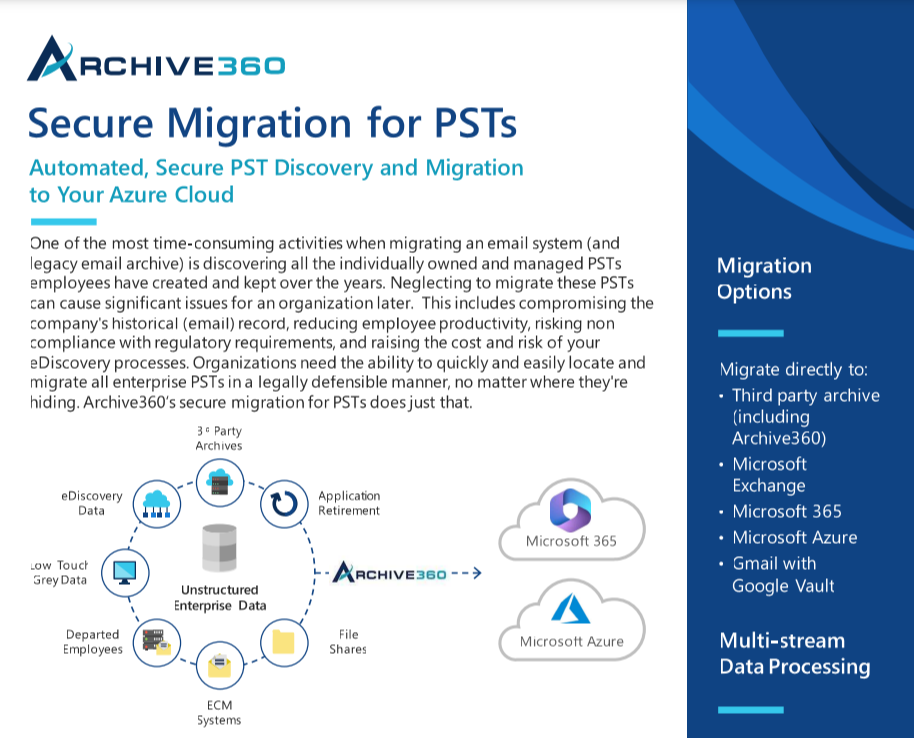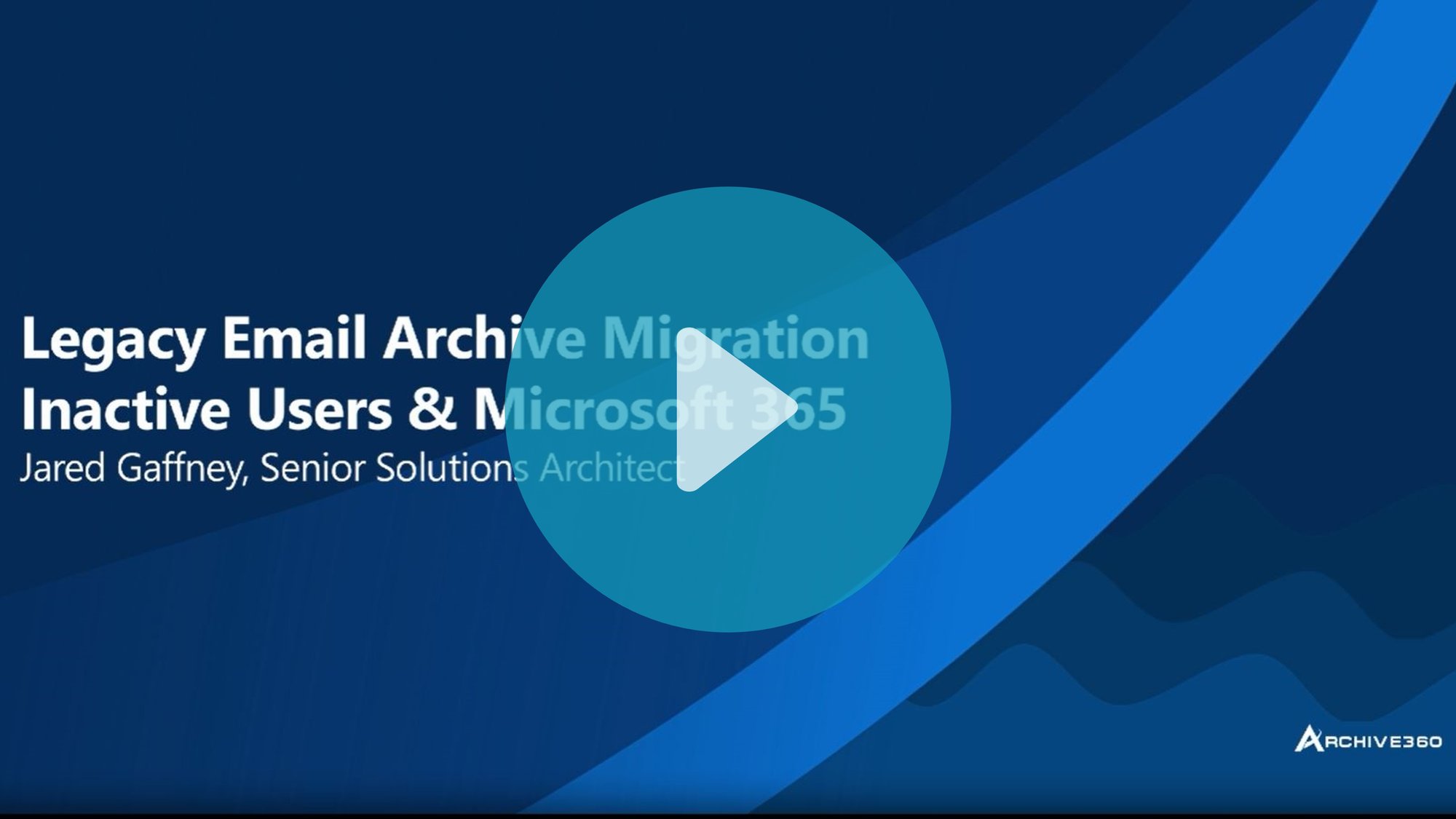Assess the New Outlook's Impact
Do you have PSTs? Where are they? What do they contain?
Fill out the form below to run our PST Discovery tool and receive your Discovery analysis report for free
.gif)
Complete the Form - Run Your Free PST Discovery Tool
- Enter details and click “submit” to consult with a PST migration expert
- Run our PST discovery tool
- Review your discovery report, plan for a successful PST migration
I want to find my PSTs and get a Free Report
Mitigate Your Outlook PST File Risks
Migrate PST Data to Archive2Azure, Microsoft 365, or Exchange
Data Loss Risk
Emails can contain sensitive personal or operational data that is susceptible to being lost when moved to PST files. PSTs are typically stored on devices which are rarely backed-up. PSTs also corrupt easily. These factors make recovering PST data difficult, if not impossible. The only way to prevent PST data loss is to eliminate PST files altogether by migrating their data to Archive2Azure, Microsoft 365, or Exchange.
eDiscovery Risk
Since PST files are stored locally, the most challenging aspect of an eDiscovery project is often locating, centralizing, and processing the many thousands of PSTs across the organization. Even if you find the PSTs on all the devices, there is no way to search them using Exchange Server eDiscovery tools. Failure to satisfy eDiscovery requests can be costly. eDiscovery risks can be avoided by eliminating PSTs and moving their data to more accessible storage.
Compliance Risk
Preserving and protecting sensitive information including HR records, customer information, financial reports, personal identifiable information are requirements of regulatory and internal policies. Failure to comply with these guidelines puts your organization at risk of fines, litigation / remediation costs, as well as loss of public trust. By storing email in PST files, users circumvent your email lifecycle management policies, retaining messages longer than required or deleting messages they are required to keep.
Save Your Organization The Hidden Costs Of PST Proliferation
Do Not Let PSTs Keep Your Organization in the Dark Any Longer.
Discovery & Noncompliance Costs
Support Costs
Storage & Backup Costs
Discovery & Noncompliance Costs
Since emails in PST files are locally stored on workforce drives, IT administrators subject to eDiscovery requests are burdened with locating, centralizing, and processing PSTs before their email content can even be searched and reviewed. Fulfilling eDiscovery requests within regulatory time constraints is challenging enough, yet if the targeted content is lost or corrupted further delays are not just administratively costly, they could result in litigation costs, fines, and reputational damage.

Support Costs
PSTs not only make email content difficult to find and review, the more files there are and the larger they become, the greater the potential for IT support tickets related to poor Outlook performance, and file corruption. Remote workers using mobile devices with Exchange ActiveSync, Outlook Web App or network shares cannot open PSTs, providing more PST-related issues that waste valuable IT time, and increase costs.

Storage & Backup Costs
PST files are notorious for capturing duplicate emails. The average size of a PST file is several gigabytes and every time a PST file is opened the file system gets updated, triggering excessive backups for unchanged data. As a result, the amount of storage PSTs consume can be staggeringly costly. Migrating PST file data into Microsoft 365 storage included with your subscription or more cost-effective Azure storage can significantly reduce storage and backup costs.

Automatically Move PST Data to More Accessible and Manageable Storage
Eliminate PST Files. Respond to Email Investigations More Efficiently, Cost-Effectively, and Defensibly.
Identify All PSTs
Our solution is easily deployed using existing desktop management solutions already in-place. Search local drives, network shares and synchronized cloud accounts for all PSTs. Identify owner, location, utilization, messages, attachments, and size of both connected and disconnected PSTs. And proactively manage data migration, leveraging the distributed power of your endpoints and optimized network capacity.

Migrate PST Data
Automatically migrate PST data into Archive2Azure, Microsoft 365, or Exchange in the background without impacting the user experience. PST files are migrated and organized the same way end users are used to interacting with them to minimize workflow disruption. Monitor the migration progress at both the item- and PST-level for status, completion, and validation.

Maintain Data Fidelity & Compliance
All data processing errors are handled per item to mitigate any existing data corruption. Bandwidth controls and time-of- day restrictions prevent user experience, network, or system performance issues. Each message is reconciled with MAPI validation, comprehensive exception reporting, remediation and reprocessing of all failed messages to ensure full data fidelity and authenticity. Once done, Archive360’s secure PST migration solution disconnects the empty Outlook PST files and deletes them.



.jpg?width=750&height=500&name=global%20banking%20(1).jpg)

